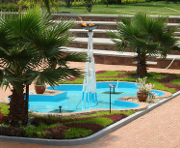Haiti (MNN) — The worst-case scenario on Haiti's cholera
scope has occurred. The disease has
shown itself in the capital city, Port-au-Prince.
Another three million people are
at the mercy of an epidemic that has
killed nearly 600 and sickened thousands. Scott Hendrix, Global Aid Network Vice President for Relief and
Development, says after speaking to their healthcare teams, "I think that
number is much higher, because many towns aren't able to report the cholera
outbreaks and the deaths from cholera. We've heard that there have been over 7,000 people who have
been infected."
Tropical Storm Tomas exacerbated
conditions by causing mudslides that closed roads and flooded water
sources.
On Wednesday, Haiti's health ministry declared
the disease a threat to the entire nation of 10 million people.
In responding to the January earthquake, Global Aid Network teams included focus on prevention and education. To prevent further spread, they've started hygiene training through the churches. "When the people hear about cholera in their village, they leave to another village where they have family or friends, which is spreading the cholera outbreak." GAiN teams are working to dispel the misconceptions about the deadly disease coming from bug bites or water purification that don't work.
To that
end, Hendrix says, "We have a donation of a 6,000 gallon water
tank. We have water purification at our compound, so we want to fill that tank
with clean water and then go into other villages and provide them
water to drink and water to use in their cooking."
The team distributed all but 350
of their original 12,000 water purifiers that will take out the cholera
bacteria. "Those water purifiers will
clean out about 800 gallons of water per day, so we can give it to a family
that can help about five other families."
Hendrix continues, "We don't just provide the clean water or
provide the hygiene training. We'll go back in and show the 'JESUS' film," he says, adding that they work through the
churches because they know the people who are impacted the most and can
minister to the people in the villages after the water teams leave. "We'll give them Bibles, give them tools so
that they can touch them in a physical way, and then touch them in a spiritual
way by sharing the Gospel,"says Hendrix.
Consider how you can pray, give or go. The details are here.

